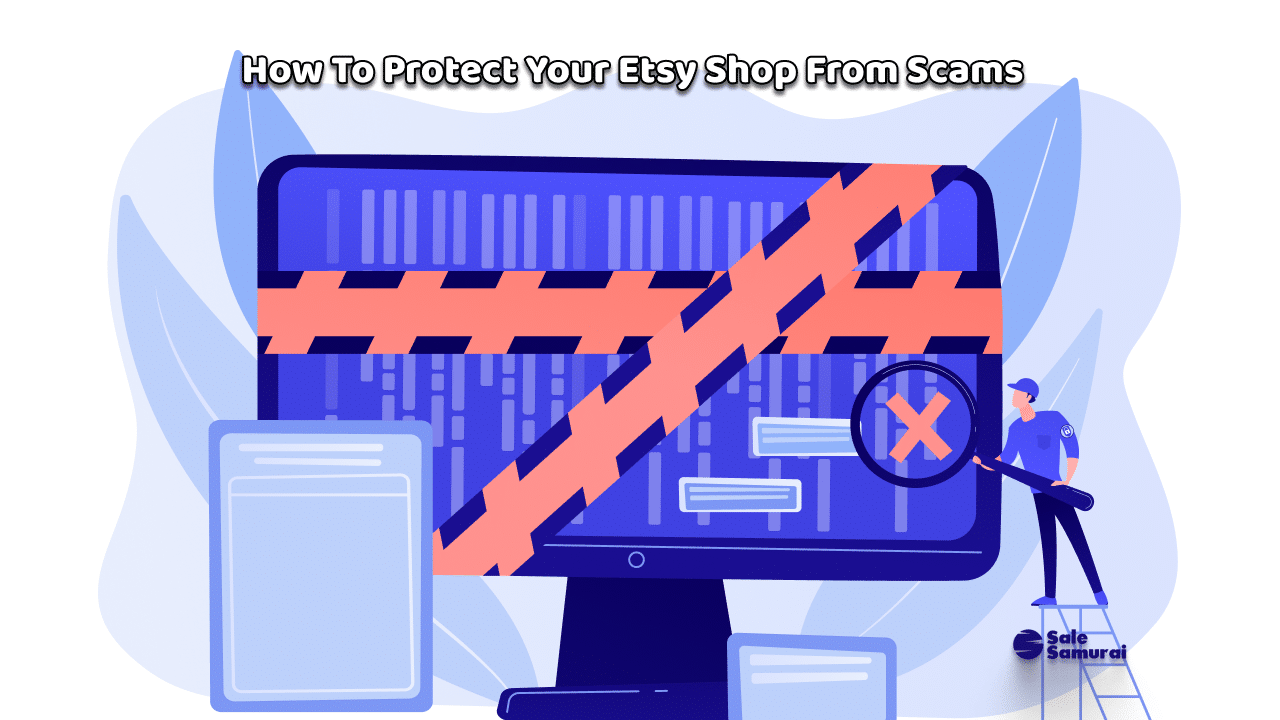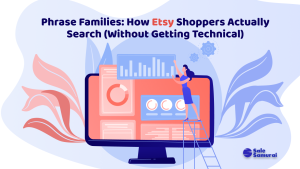
Etsy is generally a safe and professional platform for sellers to join and list their products for sale. Like all large websites with tens of millions of users, Etsy is not immune to growing online scams. While the E-Commerce platform is doing everything behind the scenes to ensure that scammers cannot access the platform there are still some things you should be looking out for as a seller on Etsy.
How To Protect Your Etsy Shop From Scams. Protect your Etsy shop from common scams like scammers pretending to be from Etsy by staying informed, being cautious, and by ensuring messages are legitimate and from Etsy before sharing personal information, clicking links, or giving access to your account.
Scammers are coming up with new and creative ways to convince sellers to provide personal information including emails and passwords as well as click on links that redirect to websites that look like Etsy.com. These scams are not as easy to spot as you may think so in this article we are going to cover common Etsy scams with examples and what you can do to protect your Etsy account.
Growing Etsy Scams
Scammers on Etsy have generally targeted buyers by setting up fake shops. However, more and more scams are being directed specifically at sellers.
These people are pretending to be from Etsy Support or acting like interested customers in order to appear legitimate and trick sellers.
In general, scammers seem to be targeting new sellers and Etsy shops with expensive items.
Still, it’s important to air on the side of caution and be aware of what sort of messages you should be looking out for on Etsy to avoid being scammed!
Before we cover the most common scam messages on Etsy with examples you should know about a growing theme on Etsy.
A growing Etsy scam involves creating a sense of immediacy and urgency in regard to a small issue that needs to be solved with the threat of shutting down your shop.
The scammer will use urgent language notifying you that you are temporarily unable to receive sales or that your account information is outdated.
Now this all sounds fine for the most part but then the scammers, to further create a sense of urgency, will always mention that your shop or account will be suspended or deleted if you do not take care of the issue immediately.
Don’t fall for this ridiculous trick!
Read on to find out what to do if you receive a message like this.
The Most Common Etsy Scams (Examples)
The most common Etsy scams involve scammers pretending to be either Etsy or a customer messaging you inside of the platform and requesting that you share information or click a link.
Now this may seem fairly obvious but read below to see how ingenious some of these messages can be.
Example 1
“Hi! I love your products. I really want to purchase this one [INSERTS LINK]. Do you also sell it in red?”
Everything seems fine with the message. In fact, as a seller, you are rewarded by Etsy for how quickly you respond to messages.
What you need to look out for here is the link they sent you.
Etsy links always start with etsy.com or help.etsy.com. If the link the scammer sends is not etsy.com then don’t click on it!
Scammers will create websites that look like Etsy with a URL similar to Etsy’s in order to get you to click it at which point they may ask for you to sign into your Etsy account giving your account information!
Example 2
“Hello, Etsy Support here! ☺️ We are writing to you regarding your account. Your shop is currently unable to process new orders because your bank details are out of date. To restore your shop and update your payment information send us your email by replying to the message. You will receive an email with steps on how to proceed. If you fail to reply to this message within 24 hours, your account will be suspended. We apologize for the inconvenience, Etsy.”
First of all, Etsy already has your email! If they wanted to email you they would.
Secondly, Etsy Support is not in the habit of using emojis, urgent language, or threatening to close your account within 24 hours.
Why would out-of-date information or the need to verify your account lead to Etsy blocking your shop?
This message also comes in the form of something like this: “We would like to notify you that your shop has been blocked due to suspicious activity.”
The message is too vague.
Example 3
“Hello, I would like to place an order but Etsy Support said that I need your E-mail because you are a new account.”
Scammers will often use variations of the word “email” spelling it like “E-mail” or “e.mail” so that Etsy doesn’t flag the message.
What Scammers Do With Your Information
Scammers, in general, want your Etsy login information or other personal information in order to log in to your account re-route your bank information, and divert your sales.
Using websites that look like Etsy, scammers gain access to your login information and can attempt to access your existing banking information as well.
Protecting Your Etsy Shop
To best protect your Etsy shop you need to be aware of the scams listed above.
When you receive a suspicious message from customers requesting your email or asking you to click on a link that is clearly not etsy.com then simply report the message as spam and Etsy will take care of the rest.
As for messages from Etsy Support, Etsy will always have a banner under the subject line of the message “From Etsy”.
Unless you see the yellow tag “From Etsy” then it’s not from Etsy even if the name says Etsy Support and the profile picture is their logo.
Again, simply report the message as spam.
Keep all conversations on Etsy. There is no need to go to your email to message a customer, Etsy doesn’t like that!
Keep all payments on Etsy, again the platform hosting your products and shop doesn’t want you to accept payments somewhere else.
Finally, don’t click on non-Etsy links, and always report messages that seem suspicious.
Interested in exponentially growing your Etsy shop? Contact us today!





